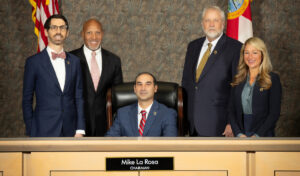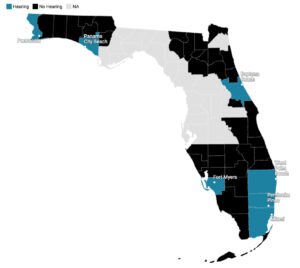The investor-owned monopoly argues consumers must bear the cost of rising power needs.
By Johannes Werner
Original Air Date: June 4, 2025
Host: Florida Power & Light has asked state regulators to give it what would be the by far biggest electricity base rate hike ever in Florida. It could even be the largest in U.S. history, adding an average $200 to your annual power bill on a permanent basis. That request comes on the back of a $1.2 billion recovery charge for repairs after last year’s storms that has already added around $150 to your annual power bill. A coalition of economic and climate justice grassroots organizations is pushing back.
Johannes Werner: FPL has argued it needs the hefty rate hike to respond to population growth in Florida, rising power consumption, and new battery storage technology. Supporters have said the utility needs added revenues to keep the grid in better shape than that of Texas, which suffered catastrophic failure during a cold spell in 2023.

The five governor-appointed members of the Florida Public Service Commission.
FPL is a state-regulated monopoly. And proponents and opponents are arguing over whether power customers should foot the bill not only for the company to improve its assets and build new ones but also to guarantee investors a cozy return on the equity they put into the company. That’s what it boils down to when the five governor-appointed members of the Florida Public Service Commission weigh the FPL rate hike request this summer.
Maria Claudia Schubert-Fontes is with Catalyst Miami. That’s a soon 30-year old advocacy group seeking a fair economy that allows everyone to thrive in South Florida. Catalyst Miami has become active in the FPL rate hike request because it is concerned about the impact on low-income power customers.

Maria Claudia Schubert-Fontes
Maria Claudia Schubert-Fontes: We know it will have a really hard impact on community members.
JW: FPL has passed on $5 billion in cost to its customers since the last base rate hike in 2021, Schubert-Fontes says. And the current request is double that.
That base rate fee hike comes in addition to other mechanisms FPL uses to pass on cost to consumers. That could be storm recovery charges and storm hardening expenses. It could be fuel surcharges when the natural gas price spikes. There also is cost recovery for nuclear power plants, and environmental surcharges to build solar and wind power.
MCSF: All of those costs are going to come down to the consumers as well. If you think about this $200, that’s the starting point for most people, but we are likely going to see higher numbers than that in the years to come. Part of our trepidation with this proposal is that it is not taking into account all the other ways that these costs will come down to consumers and the ways in which our bills will continue to increase.
Schubert-Fontes argues the Public Service Commission has not sufficiently scrutinized FPL’s request. For one, FPL has asked for a 11.9% return on equity, which is much higher than the industry standard.

Map showing territory covered by the FPL monopoly. In blue are counties with in-person hearings for the 2025 rate hike request. In black are areas without hearings.
MCSF: And that’s money that goes to the pockets of shareholders. It doesn’t actually change the way that we receive service as clients. There are different parts of the rate case that caused concern in that sense, because it’s not increasing our service; it’s not strengthening our grid; it’s just creating more profit for the company itself. It’s okay for private utilities to seek profit, but when they’re seeking such an expensive profit at the expense of Floridians that are already working very hard to make ends meet every month and working on fixed incomes, that’s the issue that we’re contending with right now.
JW: The Public Service Commission has held seven meetings for public input on the rate hike, most recently in the South Florida area. As usual, the corporation was able to mobilize a good number of supporters for those hearings. But something shifted this time. Schubert-Fontes explains that it was quite special the crowd at a recent meeting in Miami Gardens was split about 50-50.
MCSF: Miami Gardens meeting saw a lot more community intervention than we’ve seen in the past. We also saw a lot less people in favor of FPL. It was about half and half. And that was a meeting that was at 6 p.m. on a Wednesday, so people really came out to share their piece and to be involved. I think we’re seeing, throughout the state, people are really up in arms about FPL and the bills they’re having to pay. In Pensacola, there’s some really great organizing happening on the ground. In the Miami-Dade meeting, a lot of folks who were speaking in favor, when further questioned about their relationship to FPL, the majority of them had some type of relationship to FPL. Either they had worked there or had a family member that had worked there or an FPL member sat on the board of their commerce chamber or sat on the board of their nonprofit. FPL does a lot of work to polish their image in the community, and they are often donating to a lot of organizations. They put their name out there. We see it in these rate case hearings. They’re making those investments very strategically so that, when it’s time to have the public comment, they’re able to pull from multiple places where they’ve invested money and created allyship.
JW: There have been no service hearings in the Sarasota-Manatee area, but there were virtual meetings Monday, Tuesday, and today. The Public Service Commission will hold two more in-person meetings this week in the Florida Panhandle, and that’s it. The main hearing will begin in August in Tallahassee, and a final determination by the five commissioners is expected for October or November. If FPL does not show enough evidence that the rate hike is necessary, it is possible the case will be headed to the Florida Supreme Court. If FPL passes all the hurdles, the higher rates would go in effect in January.
If you missed the online meetings, there still is a chance to go on the record with your insights on how the rate hike would affect you. Written comment can be emailed to clerk@psc.state.fl.us. You can find details here.
Finally, the American Association of Retired People set up a page about the FPL rate request.
Johannes Werner, reporting for WSLR News.
WSLR News aims to keep the local community informed with our 1/2 hour local news show, quarterly newspaper and social media feeds. The local news broadcast airs on Wednesdays and Fridays at 6pm.